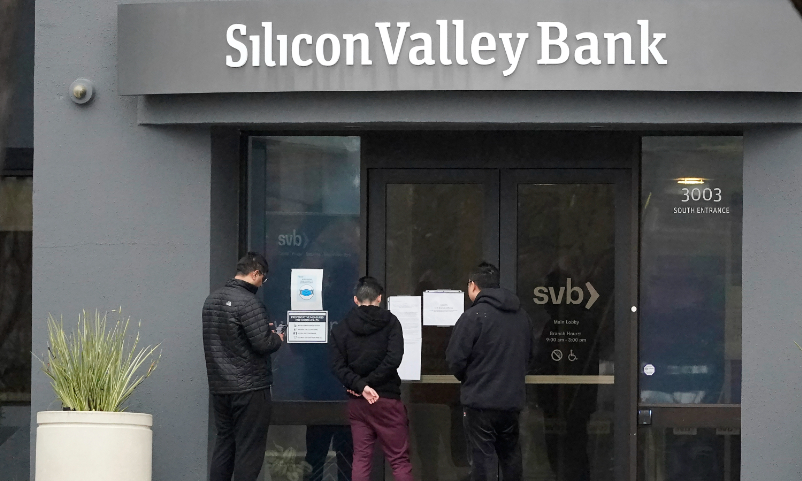
People look at signs posted outside of an entrance to Silicon Valley Bank in Santa Clara, California, on March 10, 2023. Photo: VCG
Following the shockwaves from the collapse of Silicon Valley Bank (SVB) weighed on global bank stocks, China's stock indexes also dipped on Tuesday due to negative sentiment in global financial markets, but experts said that the country's capital market will quickly stabilize, supported by China's strong economic recovery and measures to stave off financial risks.
Global markets remained volatile after the meltdown of SVB and the failure of New York-based Signature Bank over the weekend, although the Biden administration made efforts to shore up market confidence in the past two days.
The three major US stock indexes closed mixed on Monday. The Dow Jones Industrial Average dropped 0.28 percent, the S&P 500 fell 0.15 percent, while the Nasdaq Composite Index rose 0.45 percent.
US regional banks were among the hardest hit on Monday as the First Republic Bank's shares plunged a record 61.83 percent and Western Alliance Bancorp lost 47.06 percent. Citi Group was down 7.45 percent.
Biden on Sunday declared that the US banking system is "safe" and vowed stiffer regulation, saying that "Americans can have confidence that the banking system is safe. Your deposits will be there when you need them," Reuters reported.
"I'm going to ask Congress and the banking regulators to strengthen the rules for banks to make it less likely this kind of bank failure will happen again, and to protect American jobs as a small business," he added.
The shutdown of SVB will have a lingering negative impact on the financial system with the spread of market jitters, but it unlikely leads to systemic risk as the US' major financial institutions have relatively stable management in terms of liquidity and assets, Xi Junyang, a professor at the Shanghai University of Finance and Economics, told the Global Times on Tuesday.
However, an economic recession in the US may come in another wave of bank failures, said Dong Dengxin, director of the Finance and Securities Institute of the Wuhan University of Science and Technology.
As for the Federal Reserve's upcoming move on rates, Dong noted that the US central bank has so far remained ambiguous as it is concerned about the recent bank failures.
Affected by nervous market sentiment, banking stocks in Asia extended declines on Tuesday, with Japanese lenders hit particularly hard. Japan's Nikkei dropped 2 percent and the Tokyo Stock Exchange bank index fell more than 5 percent.
China's A-share markets closed lower with the benchmark Shanghai Composite index down 0.72 percent and ChiNext index down 0.59 percent.
According to Xi Junyang, Chinese investors and institutions are becoming more cautious on purchasing stocks of tech start-ups, leading to the recent weak performance of the Science and Technology Innovation Board in Shanghai and the ChiNext board in Shenzhen. However, he added that the overall impact on the Chinese market is limited.
According to a report released by Shenwan Hongyuan Group, investors' risk aversion will drop in the short term, which could also impact the A-share market.
But as the odds by the Federal Reserve to raise rates by 50 basis points this month wanes, foreign capital is expected to continue to flow into Chinese shares in the coming days, analysts say.
Dong said that the Chinese banking system is largely different from that of the US, especially after strengthened regulations over the past few years, and China's financial supervision is stricter than in the US, so Chinese lenders are comparatively in solid shape.
Following the financial deleveraging in 2017, China enhanced the regulation of market players including banks. The plight of SVB is more of a lesson for Chinese lenders, but the case will not have a direct impact, Shenwan Hongyuan Group said in a note.
On March 7, China unveiled a sweeping reform plan for government institutions, including the set-up of a national financial regulatory administration, in an effort to improve regulation and deal with potential financial risks.
Chinese officials are also backing the passage of a financial stability law that will provide supervisory mechanisms for all kinds of financial activities to protect the interests of retail and smaller investors, Yi Gang, governor of the People's Bank of China, the central bank, said at a press conference on March 3.
Effectively preventing and defusing major risks is among the top priorities for 2023, according to the Government Work Report delivered to the NPC earlier this month.
Chinese economist Ren Zeping said in a report on Monday that China's economy is now recovering, and "development is the best foundation for risk prevention".
If China performs well in its economic recovery this year by ramping up domestic demand led by new infrastructure and new energy, investors' confidence will strengthen, Ren said.




